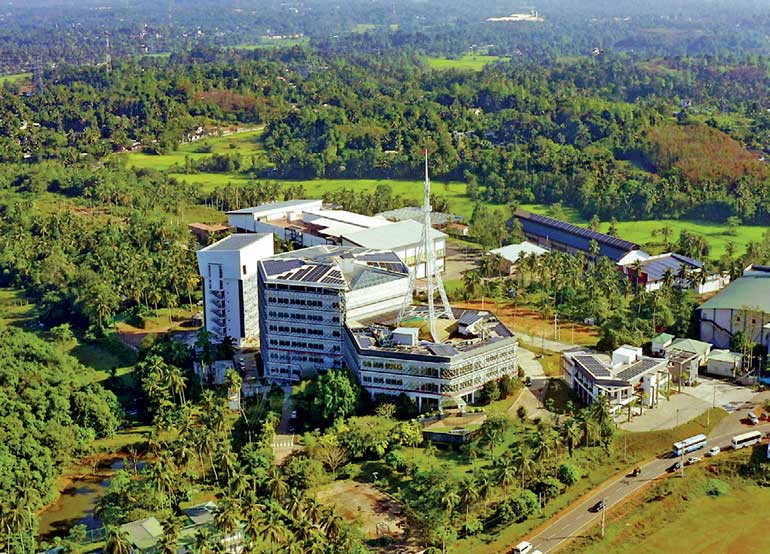Friday Feb 20, 2026
Friday Feb 20, 2026
Tuesday, 11 October 2022 00:27 - - {{hitsCtrl.values.hits}}

The SLINTEC Nanotechnology and Science Park
With the world’s energy sector moving away from fossil fuels toward renewable energy sources and companies being challenged in addressing this transition in transformative ways, “energy storage” has emerged as the critical component slated to play an important role in ensuring energy consistency for a country.
Coming forward to help the Sri Lankan Government and local industries chart a path in deploying energy storage, the Sri Lanka Institute of Nanotechnology (SLINTEC) with its extensive expertise in this field of work, is now focusing on looking at and designing varied approaches in energy storage for a range of industries across the country.
SLINTEC’s strategic plan includes activities for scientific research and development to help enable the increased usage of renewable electricity. The overall mission is to facilitate the development, implementation and integration of energy-storage technologies, to optimise the energy efficiency of all kinds of energy systems and to enable the increasing use of renewable energy instead of fossil fuels.
“Energy storage has a key role to play in the transition towards a carbon-neutral economy, by balancing power grids and saving surplus energy, where it represents a concrete means of improving energy efficiency and integrating more renewable energy sources into electricity systems. This means that energy storage is going to be a quintessential part of the new power system architecture in the future,” stated SLINTEC Head of Business Development Dr. Lakshitha Pahalagedara.
SLINTEC is currently working to create novel materials for rechargeable energy storage devices for renewable storage, as well as rechargeable electrical vehicle batteries with advanced electrode material, which given the future global demand for these products, will enable Sri Lanka to attract vast amounts of foreign investments. SLINTEC is partnered with USAID and AMCHAM for these ventures.
SLINTEC is also conducting research and development activities in the areas of lead-acid battery electrodes, advanced electrode materials for Sodium Ion batteries, graphene based anodes for lithium Ion batteries and graphene based supercapacitors. The plan is to attract investors for technology development and establish a state-of-the-art battery testing facility which will be catered to the entire region.
Sri Lankan vein graphite is incidentally the best material to commercially process graphene, where the island is also the only commercial producer of vein graphite, with the highest purity graphite with a carbon content of 97-99.5%.
Given this context, SLINTEC has created an economically viable patented method to process Graphene at one of the lowest processing costs in the world, where they have set up a joint venture with Ceylon Graphene Technologies Ltd. (CGTL), to mass manufacture graphene for the global demand adding value to local mineral Graphite. Currently, a manufacturing plant been set up at SLINTEC Technology Incubation Centre at SLINTEC.
SLINTEC Team Lead in Graphene and Advanced Materials Research Dr. Nuwan de Silva explained that with graphene being ideal for the production of energy storage devices and Sri Lanka being the only country that produces ultra-pure highly crystalised graphite in the world, backed by the global graphene market value being expected to greatly accelerate , means that countries such ours can play a crucial role in the coming decades to drive the country towards advanced product design engineering using graphene-based products. “Our strategic focus is to facilitate the energy transition and develop the infrastructure needed for our industries to move towards sustainable and low carbon energy use,” he added.
With the global demand for power estimated to grow by 50% by 2040, making it imperative that energy is affordable, SLINTEC is well-placed to be the catalyst that will play a leading role in the country in making the nations electric grid more secure and resilient, industries more sustainable and help manufacturers reduce waste.